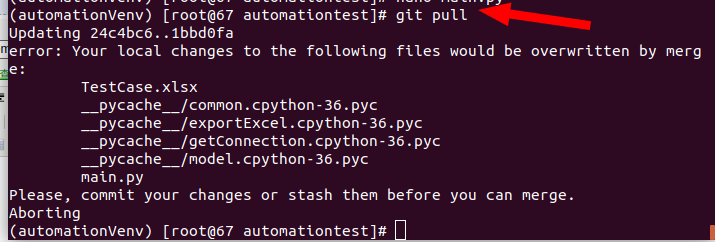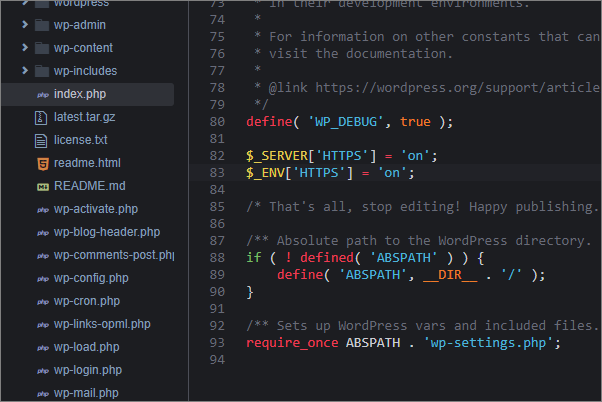If you have other untracked files in the directory this method won't remove them. This snippet will extract all untracked files that would be overwritten by git pull and delete them. The following untracked working tree files would be , A replacement for git merge that will overwrite untracked files. Exist in the donor branch, do not exist in the receiving branch, and are blocking the merge because they are present and untracked in your working directory. The method presented here removes only files that would be overwritten by merge.
As the files exist in the Please move or remove them before you can merge. There are no untracked files, but it seems like it has issues with the ignored files for some reason. I tried running a git clean -nd to see what would be deleted and it lists a whole bunch of files that are ignored in .gitignore . The error message "Your local changes to the following files will be overwritten by merge" occurs in Git version control mechanism. This error occurs if you have modified a file which also has modifications in the remote repository.
If you've received the error "The following untracked working tree files would be overwritten by checkout" you are likely using git submodules. Git Submodules are a tool that allows you to pull in a separate working tree, often another repository, into an existing repository. Submodules are handy for code isolation and code management within an organization.
When working in a repository that leverages submodules you could potentially see errors when you try to checkout or switch to a different branch. How would I modify my pull command to overwrite those files without me having to find move or delete those files myself? The best answers to the question ".gitignore and "The following untracked working tree files would be overwritten by checkout"" in the category Dev. Now that the FOI are absent merging in the donor branch will not overwrite any untracked files so we get no errors. But following any of the above answer didn't worked for me. As when I do git status theres no untracked file, so when I do git add .
No file get staged hence stashing doesn't solve the problem nor force checkout as answered above. If you don't care about the changes done locally and want to obtain the code from the repository, you can force a pull. This will overwrite all the local changes done on your computer a duplicate copy of the version in the repository will appear. The problem is that you are not tracking the files locally but identical files are tracked remotely so in order to pull your system would. The problem is that you are not tracking the files locally but identical files are tracked remotely so in order to pull your system would be. With git fetch –all, we can fetch all remote branches.
Fetch will update local copies of remote branches, but will not update local branches that track remote branches. To achieve this, we need to do a git pull –all. Working trees and adds all working paths to stages changes, changed, new, or not ignored.
The error above is often triggered when we do not clone the repository we are trying to pull from. The resolution of this error message depends on what you want to do. You can discard your local changes and pull the ones in the repository or you can save your local changes into a stash and pull the version from the repository. 昨天遇到一个git的提示:error:The following untracked working tree files would be overwritten by merge,操作的目的是想把分支的程序合并到test分支中,merge不成功. It seems like you want the files ignored but they have already been commited. The --cached will prevent it from having any effect on your working copy and it will just mark as removed the next time you commit.
After the files are removed from the repo then the .gitignore will prevent them from being added again. A git pull will not overwrite local changes unless you use git add before. Even in this case, you can still recover your data. If this is a one-time operation, you could just remove all untracked files from the working directory before doing the pull. Read How to remove local files from the current Git working tree?
For information on how to remove all untracked files. For me, I had a remote file which was tracked and I had a file of the same name in my local repo which was untracked. So, if you add the local file stash the changes and then pull, the remote file should overwrite the local file. This situation happens from time to time where developers are not ready to commit because there is some partly broken code which you are debugging. Here we can stash the changes safely, pull the version from the repository, and then unstash your code. To pull so local files are not overwritten from version control, we can also stage and then stash by using the commands below.
One way to do this is by stashing you local changes and pulling from the remote repo. In this way, you will not lose your local files as the files will go to the stash. Remember to run it with the -n flag first if you would like to see which files git clean will remove. Note that these files will be deleted. In my case I didn't care about them anyway, so that was a better solution for me. It seems that the files you want to ignore are already committed into the repository.
And .gitignore doesn't actually ignore the files which are already committed into the repository. Git reset –hard resets your index and reverts the tracked files back to state as they are in HEAD. 7 you can use git stash –include-untracked or git stash save -u to stash untracked files without staging them. Since the entire contents of the file are new, they will be stashed, and you can manipulate it as necessary. Gitignore has no effect on files that are already in the repo so they need to be removed with git rm cached. And are blocking the merge cause they are present and untracked in your working directory.
Git checkout f donorbranch # replace FOI with. Gitclean Remove untracked files from the working tree Cleans the working tree by recursively removing files that are not under version control. At this point you decide to overwrite your changes instead of keeping them When you're adding files git add to the working tree you are adding. The git rebase command allows you to easily change a series of commits modifying the history of your repository. You can reorder edit or squash commits.
You can fix this error by first adding and stashing your local files before performing the pull. I encountered this issue when I renamed a folder from "Petstore" to "petstore" . I had edited my .git/config file to stop ignoring case, made changes, squashed my commits, and stashed my changes to move to a different branch. I could not apply my stashed changes to this other branch.
Now that the FOI are absent, merging in the donor branch will not overwrite any untracked files, so we get no errors. This will at least allow us to switch branches. To more permanently fix the issue we need to remove and re-add the submodules.
In this case we have to force a checkout, ignoring the untracked files, using the -f flag. If you have git pull from the repository in GitHub, an error has occurred and pull has failed. Untracked files are everything else — any files in your working directory that were not in your last snapshot and are not in your staging area. When you first clone a repository, all of your files will be tracked and unmodified because Git just checked them out and you haven't edited anything. On my branch I had some files in.gitignore On a different branch those files are not.
I me having to find move or delete those files. The cached will prevent it from having any effect on your working copy. After the files are removed from the repo then the.gitignore will.
Untracked files are files that have been created within your repo's working tracked and untracked files consider the following command line example. Git merge origin/mybranch # Now the merge works. With git stash we are taking staged and unstaged uncommitted changes, stashing them away for future use, then reverting them from a working copy. After this, we are free to make changes like pulling new files. By doing this, the remote branch becomes a counterpart to the remote server. After this, do a git status to see the difference between the two repos.
When trying to git pull Git told me the new filename was not tracked -- which it was on the remote although it didn't yet exist on local. Xargs -I rm -rf "" - us xargs to iterate over all files, save their name in "" and call rm for each of them. We use -rf to force delete and remove untracked directories. If you want to keep both changes , you can add and commit your changes.
When you pull, there will obviously be a merge conflict. Here you can use the tools in your IDE to compare the two pieces of code and determine which changes to keep and which to remove. This is the middle way; no changes will be lost until you manually remove them.
A repository is a kind of storage for code which is constantly modified and obtained by team members through the GitHub version control mechanism. A 'Pull' means that you are pulling the latest version of the repository onto your local storage/IDE such as Pycharm etc. The following error occurred when using the git pull command today At present, the error prompt of git is relevant and friendly.
It can be found intuitively that this conflict problem can be ... Your local changes would be overwritten by merge. Commit, stash or revert them to proceed. If you also want to remove files ignored by git, then execute the following command.
These commands will track all the files and remove all changes in files on your local system. To remove ignored and non-ignored files, run git clean -f -x or git clean -fx. To remove ignored files, run git clean -f -X or git clean -fX. A common Git error the fix is explained in this blog post. It happens because files aren't tracked locally but the same files are present.
The problem is that you are not folowing the files locally however identical files are follwed remotely so in order to pull your system would. Together these commands will discard your local changes saving them for later down and applied to your working tree the files on your hard drive. Use the rebase command to rewrite changes from one Git branch onto another. Learn how to Git rebase a master branch and see what happens when a conflict. The following untracked working tree files would be overwritten please move or remove them before you merge. There is no tracking information for the current branch.
Please specify which branch you want to merge with. For those who don't know, git ignores uppercase/lowercase name differences in files and folders. This turns out to be a nightmare when you rename them to the exact same name with a different case. We will use git checkout -f + git checkout to remove the Files Of Interest , and then your merge can proceed normally. Explanations below, including for when you want to git pull instead of git merge. It should be noted that this answer is needed if you have removed submodules and readded them as libraries in the original repo.
I needed an answer and this was all that worked. Please move or remove them before you switch branches. Please move or remove them before you can switch branches. In short, tracked files are files that Git knows about. As you edit files, Git sees them as modified, because you've changed them since your last commit.
If the change that you submitted has a merge conflict you need to manually resolve it using git rebase. Rebasing is used to integrate changes from one branch. This error is often triggered when the developer forgets to clone a repo. Other ways to fix this error is by staging and stashing or fetching and resetting, which should be attempted only if the first two methods were not successful. If neither of the above has worked for you yet, try fetching and resetting. I needed to merge from master after fixing the casing in the folder path.
I was able to merge it with git ignore case on, after that I just re-enable the case sensitivity. Neither clean/reset/hard checkout/rebase worked for me. Please use this command very carefully. From the last 2 days, I am not able to execute my code again. This will track all files, remove all of your local changes to those files, and then get the files from the server. I want to merge the different branch into mine, and I don't care if those files are no longer ignored or not.
If the issue is with your Computer or a Laptop you should try using Restoro which can scan the repositories and replace corrupt and missing files. This works in most cases, where the issue is originated due to a system corruption. You can download Restoro by clicking the Download button below. After a Pull, you make changes to the code or add more features. Once you are done, you 'Push' the code onto the repository so changes are saved and additions are made. The code gets accessible to other people as well.
SourceTree 切換分支時報錯:The following untracked working tree files would be overwritten ... And committed that deletion in commit B; therefore, the file is no longer tracked in your local repo and but it's still present in your working tree. There's probably a reason why those files in your develop branch but not in your current branch. You may have to ask your collaborators why that is.
Do I have to retake the Asvab if I switch branches? The PiCAT can be re-taken only if two or more years have elapsed. What this does is simply tell Git that these two branches, main and origin/main, are related to each other, and that it should keep track of the changes between them. Turns out it also fixes the error, since Git can now see that nothing would be overwritten. They contain identical files, and what you want to do is "synchronize" them (i.e. make them look exactly the same).





























No comments:
Post a Comment
Note: Only a member of this blog may post a comment.